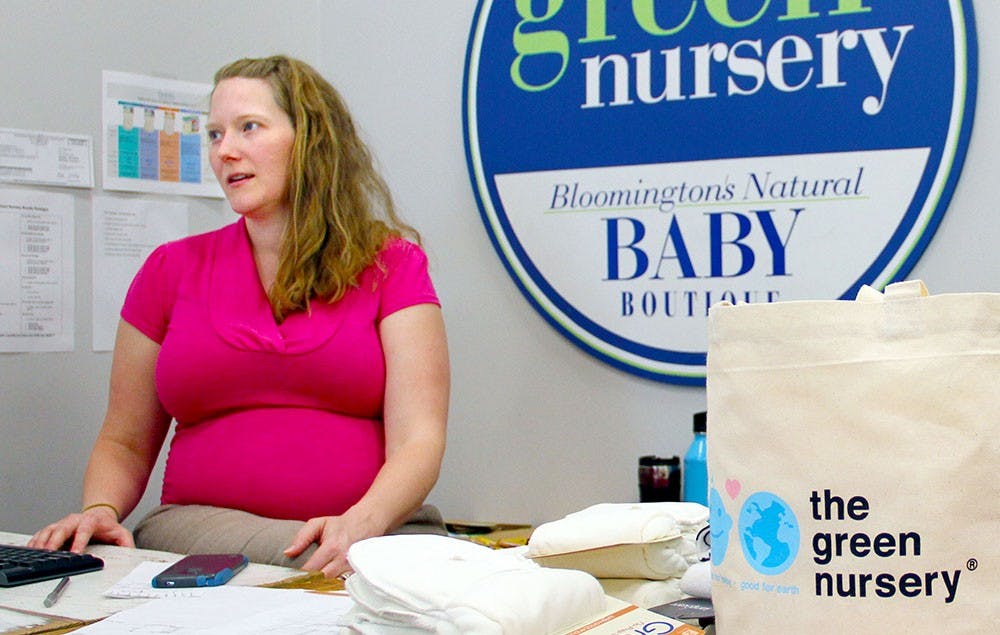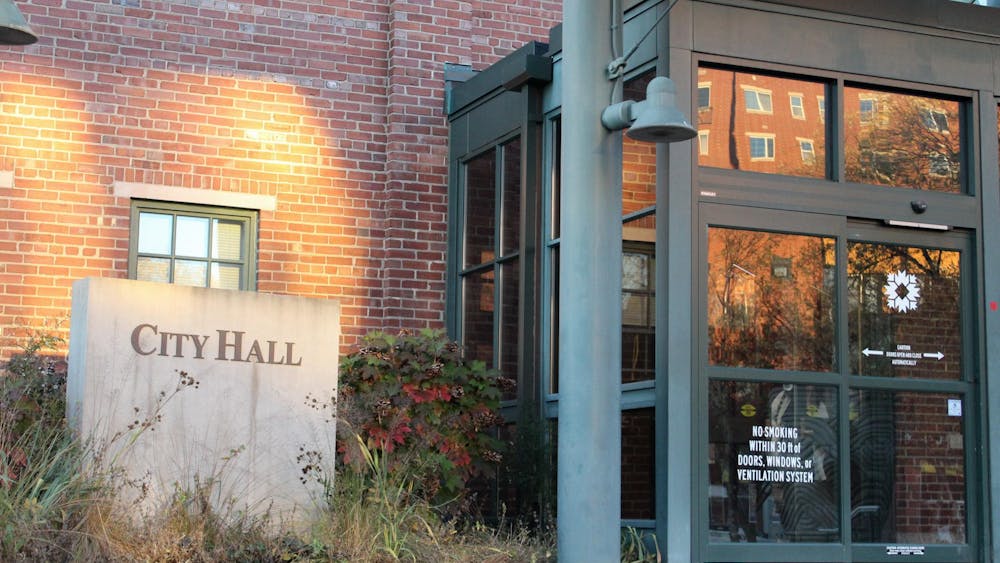Inside The Green Nursery store, by the cloth diapers, teething necklaces and baby carriers, stand Merrisa Hunting and the daughter she birthed in her home three and a half years ago.
Hunting breastfed Malaina, her daughter, for over two years, and she also used glass bottles and natural foods. She had a home birth with a midwife to assist her because she said she doesn’t trust hospitals.
“People want to downplay who we are, so that way the medical industry can get in and market all of the things,” Hunting said.
Hunting is not the only mother using this “crunchy mom” style of parenting, which is focused on emotional, physical, social and environmental consciousness.
Brianna Alexander, manager of Green Nursery on Kirkwood Avenue, worked her shift adorned in a teething necklace for her daughter Marlena.
In Bloomington, Alexander said, there is a lot more attachment and crunchy parenting. Attachment parenting is the idea of fostering a very close relationship between the child and parent through constant attention and care. Social Media is a contributor to new trends such as baby wearing and cloth diapers, she said. Baby wearing is the trend of parent wrapping their child in cloth against their chest.
“There’s the saying: it takes a village to raise a child, and people’s villages now are online, so there’s a lot of Facebook mom groups,” Alexander said. “The community is online and it’s much broader than local, and a lot of information is being shared around.”
A Facebook search for Bloomington Moms yields 20 groups to join. One such group is Hoosier Mamas, which is a mom meet-up group that meets regularly to discuss their experiences, according to their Facebook page.
Alison Onis started using the internet to find other moms to connect to and set up playdates for her son, Noah.
Onis said she follows some of the strategies of the more environmentally conscious moms, but not all of them. For example, she doesn’t use cloth diapers.
“I think some of the things are going back to the way things were done in the past,” Onis said. “A lot of it comes to being green and not producing as much waste.”
For mothers like Hunting, home birth and attachment parenting come from a place of mistrust in hospitals. Two of Hunting’s sisters each lost a child due hospital error, she said.
During the home birth, she said, she felt completely relaxed and was able to lay in her bed with her child after. She said she was able to avoid the awkward gown, the beeping noises and the large amounts of people.
“I didn’t want to be rushed through having a baby, and I didn’t agree with everything the doctors pushed on you,” Hunting said. “Sometimes when things are delayed, they want to induce you or perform a C-section, which is something they’re pushing a lot more nowadays, so I just thought a home birth was the best f or us.”
Communication and attention are key, Hunting said. Her daughter, she said, was given to her to protect and to teach.
“I’ve seen a lot of young moms like me, and their children, as babies, will be in the back seat crying and, because it’s foreign to them, they’ve been in your womb for nine months and now they’re letting go,” Hunting said. “And that’s scary to be pushed aside, so they just want to know that you’re there.”
These are all fairly new moms with young children, but Ann Smith raised her children in the 80s and 90s and, at least for her, there are a great many similarities between mom culture then and now.
Smith used cloth diapers, but for the financial benefits instead the environmental ones, she said. She also had all five of her daughters at home, except for the first one, which she had on The Farm, a hippie commune in Summertown, Tennessee. Her other four daughters were all born in her home.
The largest change Smith said she noticed is the increase in technology to which children have access. However, she said she is supportive of the crunchy parenting style.
“I think it’s very cool and idealistic and along with that comes the organic mindset of sustainability and low impact,” Smith said. “I admire it.”
Smith is supportive of attachment parenting until the child reaches a certain age, she said. She said it is odd when she sees a parent carrying a child everywhere when he or she is over the age of two.
Alexander’s more traditional family thought she was crazy for moving to cloth diapers and other less common methods of child rearing, she said. Even for her second chilwd, she said, the family still didn’t buy her cloth diapers for the baby shower, even though she had them on the registry.
Alexander said her family was worried about her son, Leo, because she was feeding him whole pieces of food instead of the typical pureed food like her sister was using with her child at the same time.
“It was kind of interesting that we had one person in the family doing it one way and us doing it different and seeing how it turned out,” Alexander said.
Bloomington is a little crunchier than most, she said, so she was still able to pursue those methods and the benefits that come with them.
“I think there’s a lot of long-term benefits to tending to your children’s needs and teaching them how to regulate their behaviors and emotions in opposition to having a more hands on type of approach,” Alexander said.
Many people scrunch their noses at ideas like cloth diapers, said The Green Nursery Sales Associate Alyssa Jones, who is a mother of one with another child one on the way. She spoke about the recent idea of mommy wars, which is when moms become competitive about their parenting styles.
The primary goal of a mom, Jones said, is to keep her baby alive. Some moms look down on the methods and choices of other moms that differ from their own, which isn’t how it should be, she said.
“That’s not what we’re here for,” Jones said. “We’re not here to judge other people. We’re here to raise our kids, make our own decisions and live our own lives in this big world.”






